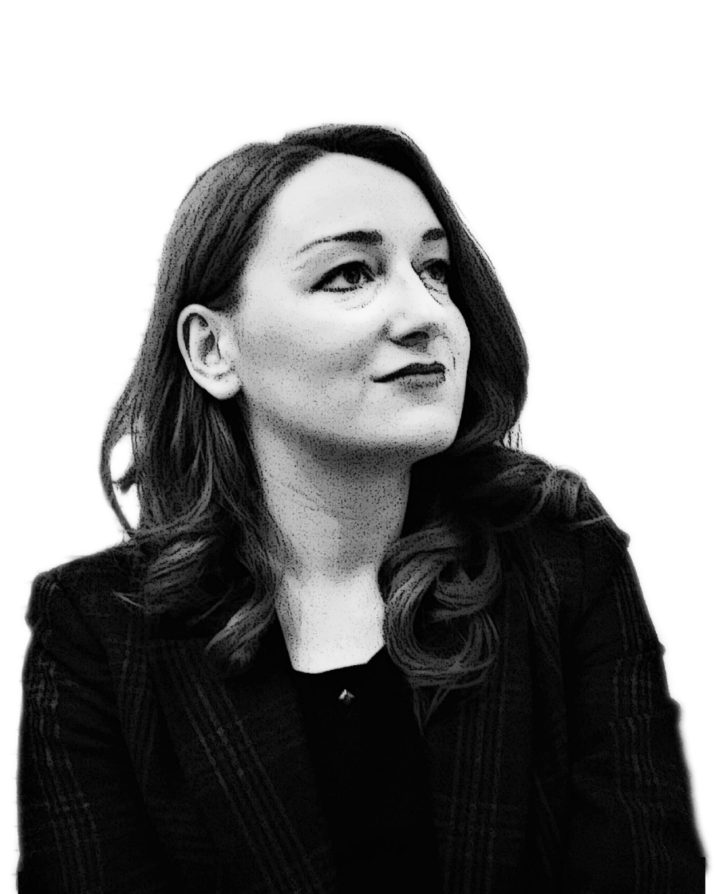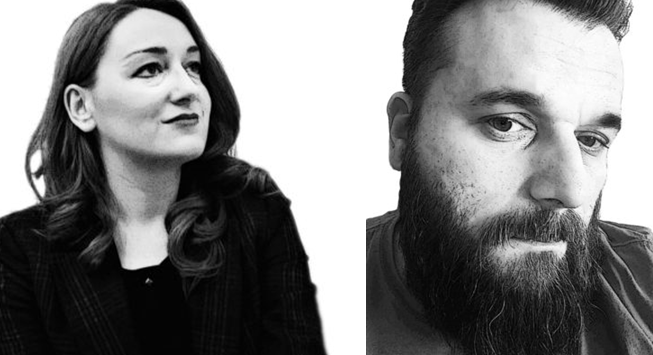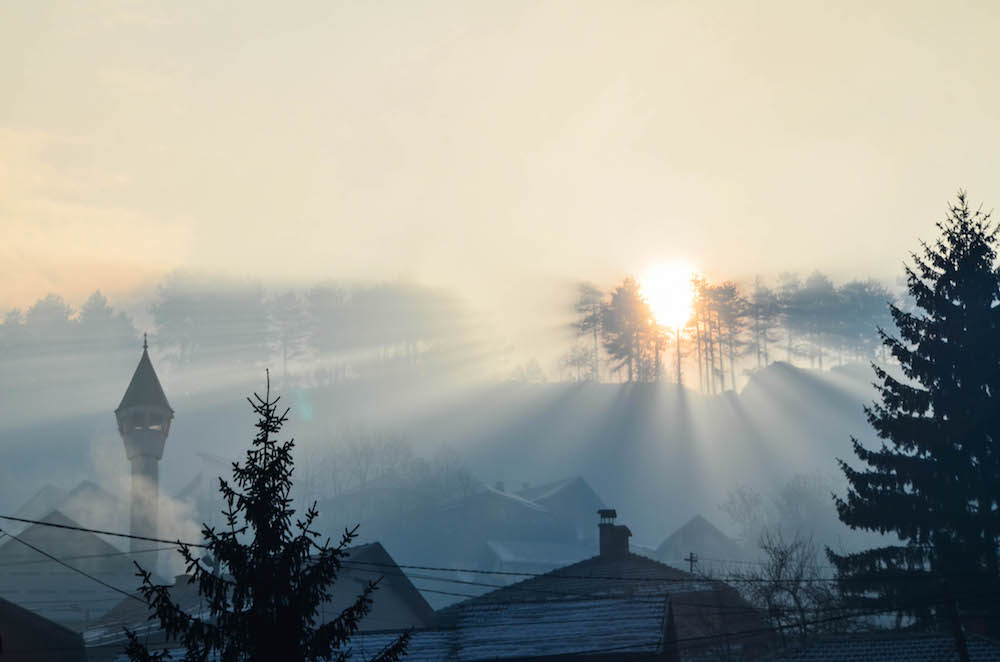

Translated from the B/C/S by Mirza Purić.
“Oh, Menso, the trouble you’ve lived to see!” he said to himself, as his breath turned into whitish mist in the cold.
He was walking in his neighbourhood, looking around. The streets were incredibly empty. He didn’t think it was possible not to see anyone that day. Unusually, not even his neighbour Mara had left her flat to do her morning shopping. She never missed her morning walk. Menso knew this because he preferred spying on his neighbours to watching breakfast television.
A voice was booming in his head.
Look right, look left. Have a little peek.
He didn’t even want to look to the other side of the neighbourhood. He’d known for a long time there wasn’t much to see anyway. He was afraid he would get sick if he looked, as he did on that day when he withdrew into himself, his small flat, his mouldy room. On this coldish morning, he decided, with great difficulty, to go out and buy some coffee. He would’ve eschewed even that if he’d had any coffee left. All those countless times he’d thanked God and the heavens for his wife’s making sure they were well stocked. The only thing that worried him was where to find a roastery.
Gah, if there’s any to be got anywhere.
He looked at his watch. Half past eight, nobody out in the street.
“God, is it even a working day?” he asked himself and pressed on.
Menso had stopped counting days, although he had a big calendar in his kitchen. He avoided it as if it were guarded by all the hounds of hell. He couldn’t explain to himself why, after he was left alone, he withdrew from everything.
A bit further from his neighbourhood sprawled an enormous road with three and a half lanes. There were no more flowers along the kerbs. At least not real flowers. They had long been replaced by holograms. The day he swore never to leave his flat again, it happened that, driven by sorrow and joy, he’d reached to pick a flower. To his amazement, his hand went straight through the hologram. As he was reminiscing about that moment, Menso started to mumble sotto voce into his grey beard.
“Look what they’ve done. Now they’ve built an even bigger building by the old post office, as if the old monstrosity wasn’t enough … Never mind it being gaudy as a traffic light, each office is now connected directly to the employee’s flat. Looks like an octopus snatchin’ ’em with his greedy tentacles and devourin’ ’em.”
That big booming voice in his head said brusquely, What are you doing philosophising and talking to yourself? Where’s the bloody coffee?
“Ah, the coffee,” Menso remembered and went across the bridge to the old roaster’s.
As the sun was peering through the fog, the old man waddled through the familiar streets, reminiscing about the days when, as a boy, he ran to and fro in them. The town looked like a complete wasteland.
“They’ll be taking a break soon,” he said to himself.
In the window of Haso’s old roastery, there was a big neon sign. It read:
BEST COFFEE IN TOWN
SIGN UP
FILL IN REGISTRATION FORM
ENJOY YOUR COFFEE
Huffing and puffing from the walk, Menso didn’t understand anything. The bright light of the sign was hurting his eyes. He felt his blood pressure rise.
“What form? What kind of a sign is this? God, there isn’t a door on this thing. I can’t even come in and ’ave a sniff, see what blend I want!” shouted the disorientated old man.
Below the sign, on a big touch screen, there were two large fields in two different colours. The text above them read:
ORDER YOUR COFFEE HERE
Menso was looking at the two fields. One was green, the other red. The green one instructed:
Already signed up? Press for usual blend.
while the brightly lit red field flashed:
Not a user? Press for trial.
The poor old man broke out in a cold sweat. Red and green. Trial. Usual blend. Nothing seemed right and proper like in the good old times.
“What the hell is this? I don’t want to press and click. Nothing can replace the little table Haso used to have in front of the shop. So you pop down for a cup of coffee, he brews it just for you, you have a little chat, and then you say, ‘It’s so good, this blend is, I’ll ’ave a kilo please.’ And now you press, you register, you select … What bloody registration?” the old man was screaming in front of the red neon sign.
“So, I ain’t a user already? It’s like I’m an addict. ‘We ’ave to enter you in the Coffee Drinkers Anonymous database’,” said Menso, in a faux-female voice
His head was ringing, bleakly and consistently. The devil take ’oever made me go outside.
On the way home, it seemed to him that, old and infirm as he was, he was still looking forward to the possibility that something might change back. Although he led a solitary life and was afraid of all the changes his town had gone through, deep inside he nurtured hope that everything was just a dream and that someone would show up and stop the horrid machine that crushed everything that was beautiful and made his life better. In his thoughts, he admitted to himself he couldn’t bear the fact that everything he had once held dear was no longer dear to him, or was gone, or required registration.
“I registered a long time ago.” Menso heaved a sigh and turned the corner to his street.
There so many things were still familiar and dear to him. His attempt to buy coffee having failed, coffee was the only thing he was missing. He closed the front door when he came in and looked around the place. A fat orange cat was sitting on the yellow carpet, Menso’s only friend since his wife had died. Menso had never liked cats, nor did cats like him. His late wife loved them and fed them furtively, although he chided her for it. After her death, Menso found comfort in saving and adopting a kitten to remind him of his wife. The cat swished his tail, scanning Menso with a beseeching gaze. The old man waddled to the kitchen and leaned on the sink. He raised his head towards the ceiling and said with annoyance, “I’ve got to feed this bloody cat. I ’ope ’e won’t turn into an ’ologram and say, ‘Register ’ere to feed me.’”

Photographic response by Sanja Vrzić
Naida Avdović was born in Sarajevo in 1987. She received her MA in English Language and Literature from the Faculty of Philosophy at the University of Sarajevo. She is a member of the Sarajevo Writers’ Workshop and has performed her poetry and prose at the Sarajevo War Theatre (SARTR) together with her colleagues. Her work has appeared in H.O.W Journal (online) and in the first Narrative Witness publication (Caracas-Sarajevo) produced by the University of Iowa’s International Writing Program. Her short story “Hazim” was serialized in the online journal NEMA. Her paper “Postmodernism and Eschatology: Apocalyptic Vision in Kurt Vonnegut’s Cat’s Cradle” was published as part of a conference collection through Belgrade’s Alfa University. Currently, Naida works as an English language teacher at a Montessori school in Sarajevo. She writes prose and poetry in both English and Bosnian.
Mirza Purić is a literary translator working from German and B/C/S. He serves as a contributing editor with EuropeNow and in-house translator with Sarajevo Writers’ Workshop. From 2014 to 2017 he was an editor-at-large with Asymptote. He has several book-length translations into B/C/S under his belt and his shorter translations into English have appeared in Asymptote, H.O.W., EuropeNow and PEN America, among other places. He plays Bass VI and baritone guitar in a band.
Sanja Vrzić is an architect, photographer, and graphic designer. She was born in Sarajevo, where she completed a degree in architecture in 2010. Since then, she has worked as a freelancer in Sarajevo, Paris, and Nice. Her expertise is in landscape, documentary, and cultural photography.
Published on November 2, 2017.
Click here to read more on The Borders Project.




